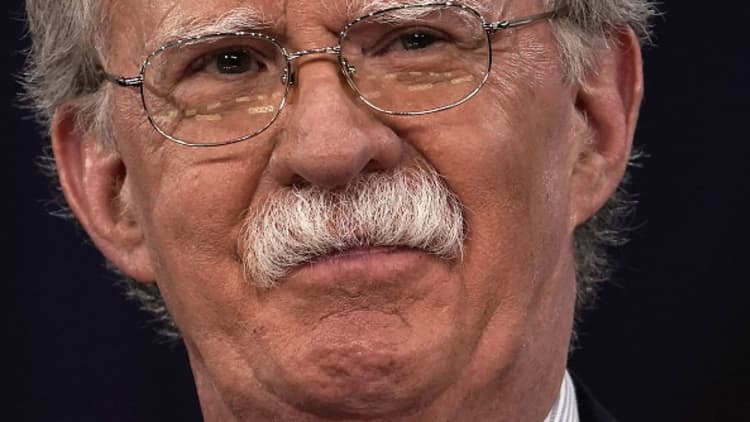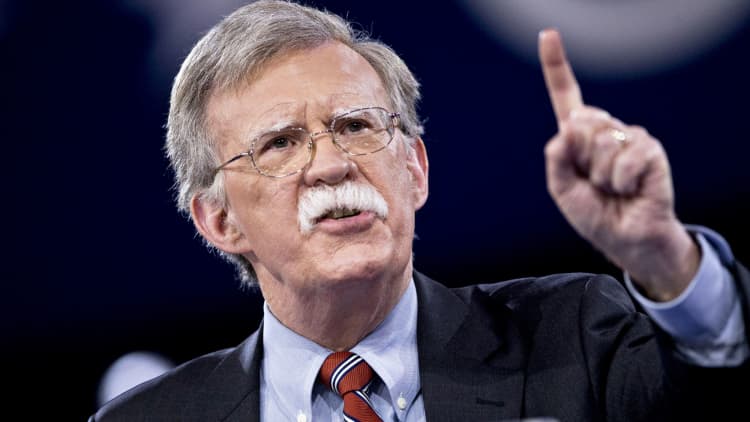John Bolton, who is days away from becoming President Donald Trump's national security advisor, has been meeting with White House attorneys about possible conflicts of interest, CNBC has learned.
The exact sticking points for Bolton are unclear, but ethics experts say the appearance of a possible future role for Bolton with an entity such as a political action committee could be a cause for concern for White House officials. Bolton's PAC and super PAC, which are no longer receiving or spending capital, have been financial players in the early going of the midterm election cycle.
White House lawyers and Bolton continue to discuss and review any potential conflicts of interests for the former U.N. ambassador, sources with direct knowledge of the matter told CNBC on the condition of anonymity. A spokesman for Bolton, however, said that there haven't been any issues.

"The ambassador's transition to national security advisor is going very smoothly and the ambassador will start on Monday," the spokesman, Garrett Marquis, told CNBC.
Bolton will succeed H.R. McMaster in the role.
So far, Bolton has done everything that he's been advised to do, according to people familiar with the matter. When the White House suggested his PACs cease all political activity, including his super PAC, Bolton agreed.
There were also questions about his role as chairman of his nonprofit group, the Foundation for American Security and Freedom. Bolton internally announced in March that he will be stepping down from his foundation with the plan to take his name off the website on April 8, according to people with knowledge of the situation.
Another representative for Bolton confirmed that he is continuing to meet with White House lawyers, but declined to comment further about the details of those conversations.
"The ambassador's conversations with White House attorneys are off-the-record conversations," the spokeswoman said.
Bolton and the White House did not return repeated requests for comment.
Bolton's PACs aren't officially shutting down
Ethics attorneys outside the administration are skeptical about Bolton's two PACs, the John Bolton PAC and Super PAC, not officially shutting down. A PAC is a committee that collects contributions to spend for or against certain campaigns. A super PAC, meanwhile, cannot spend on a particular candidate, but it is allowed to spend and raise unlimited amounts of money on independent entities that could sway elections, such as partisan television and digital advertisements.
The Hatch Act doesn't require the PACs to dissolve. The law, which was first enacted in 1939 and is monitored by the government watchdog known as the Office of Special Counsel, or OSC, says federal employees "may not campaign for or against candidates or otherwise engage in political activity," but does not explicitly demand that political operations be entirely eliminated if they were previously run by White House personnel.
A representative for the OSC told CNBC that as long as Bolton's PAC wasn't raising or spending any money while he worked in the White House, it could still keep his name and would not be violating the Hatch Act.
"A federal employee whose name is also the name of a political action committee would be in violation of the solicitation provisions of the Hatch Act, if the PAC is soliciting or accepting donations," the representative said.
Paul Seamus Ryan, vice president of policy and litigation at the nonprofit money in politics watchdog group Common Cause, said there could still be a conflict of interest because Bolton looks to be holding onto some authority within his two political fundraising assemblages.
"He should shut it down because the general gist of the Hatch Act is that they shouldn't be maintaining a super PAC," Ryan said. "That's what we're talking about here. It goes against our ethics laws for someone to be maintaining a super PAC at any level when they are high-level officials within the White House."
The Trump White House is no stranger to Hatch Act violations. In March, the OSC said senior White House aide Kellyanne Conway committed two violations during last year's Alabama special Senate election. The report claimed Conway "impermissibly mixed official government business with political views about candidates" during two media interviews in the run-up to the election, but left it up to the president to move ahead with disciplinary action against her.
The White House has yet to bring down any form of punishment against Conway, one of the president's key advisors.
What could happen to the money
Another issue that could pose a problem for Bolton is what happens to the millions of dollars being held by the PACs. People familiar with the groups' work said that they plan to hold onto the funds in the immediate future and do not intend to wind down their finances, at least for now.
Republican finance experts said that PACs sometimes hold onto their financial reserves as their leaders take jobs in the White House or any federal position as part of a larger deal with their new employer.
Charles Spies, leader of the political practice at law firm Clark Hill and chief financial officer of Mitt Romney's 2008 presidential campaign, said there may have been an agreement between the Trump administration and Bolton to transfer fundraising power to a new leader while they maintain their financial apparatus.
"There would usually be an ethics agreement whereby the public official relinquishes all control over the political entity (in this case, the PAC), but it can either give the money away, or in theory could keep it with someone else having control over the accounts," Spies said.
Big money donors
The John Bolton Super PAC has been a big player during the early stages of the 2018 midterm elections. The group has raised $3.8 million in the most recent election cycle, including receiving the financial backing of this year's top Republican donor, Richard Uihlein, founder of the shipping supplies company Uline. Robert Mercer, former chairman of hedge fund giant Renaissance Technologies and a key Trump supporter, also contributed, according to Federal Election Commission filings.
So far, the group has spent $1.2 million with the majority of their funds going toward various advertisements and polls.
However, watchdogs such as Common Cause have brought the PAC's past spending efforts to light with a number of legal complaints filed to the FEC. All of the complaints relate to the Bolton groups' work with political data firm Cambridge Analytica, a company under scrutiny for gaining access to 50 million Facebook accounts and allegedly distributing user data to the Trump campaign in 2016.
Bolton's super PAC in 2014 spent $340,000 on what it described as research and then more than $800,000 the following year. While it's unclear what was obtained through Cambridge Analytica's research, The New York Times reported in March that Bolton was purchasing services for "behavioral microtargeting with psychographic messaging."
The groups' decision not to close could reflect an ongoing legal inquiry. According to the FEC's rules and regulations, a PAC cannot shut down if they are involved with any type of official litigation or enforcement action.
The FEC declined to acknowledge whether it is investigating Bolton's super PAC.
WATCH: What you need to know about Trump's new security advisor



